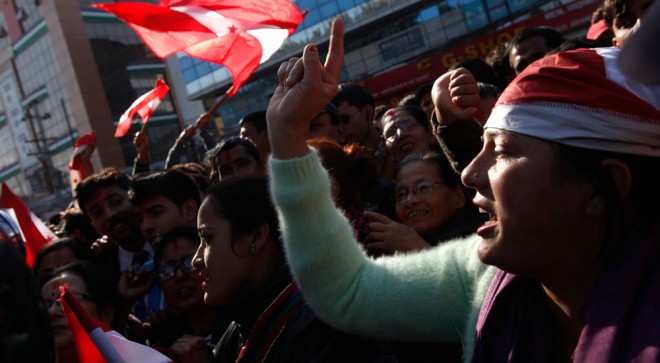
Supporters of the Nepali Congress party cheer outside a vote counting center after initial results showed their candidates winning in Katmandu, Nepal, Thursday, Nov. 21, 2013. The leader of Nepal’s Maoist party, who appears to have lost in this week’s national election, demanded Thursday that the vote counting be stopped because of what he called massive irregularities. AP
KATHMANDU, Nepal—Nepal’s oldest political party is leading the first set of results from last week’s election ahead of two prominent communist parties, the country’s election commission said Monday.
The results showed that the Nepali Congress Party had won 105 of the 240 directly elected seats. Only one directly elected seat remains to be decided. The Communist Party of Nepal (United Marxist Leninist) trails with 91 seats and the United Communist Party of Nepal (Maoist) has 25 seats.
The Election Commission said counting of the second sets of ballots—where voters pick a political party—has also started. Those 335 seats will be divided among the 122 competing political parties according to the proportion of the total vote each gets.
The election for Nepal’s Constituent Assembly was held November 19 and final results are expected by the end of the week.
The Maoists, a party made up of former communist rebels, has withdrawn from the ballot counting after initial results showed them losing most of the seats. That was a big drop from the last elections in 2008, when they won the largest number of seats.
They demanded an independent probe because of alleged widespread irregularities and have threatened to boycott the Constituent Assembly. Party spokesman Agni Sapkota said the party will decide its next move during a meeting on Monday.
Independent observers, including former United States President Jimmy Carter, have said the election was free and fair of any irregularities.
The Maoists fought government troops between 1996 and 2006, but then gave up their armed revolt, joined a peace process and mainstream politics. Their fighters joined the national army.
Political leaders in the last assembly elected in 2008 disagreed over who got to lead the nation and on creating a federal system divided by ethnic groups or by geography. The resulting power vacuum has left Nepal without a proper constitution.
RELATED STORY
Election day bomb in Nepal capital injures 3—police